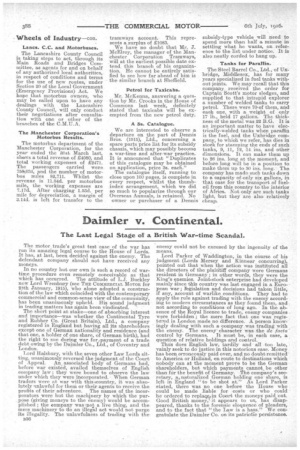Daimler v. Continental.
Page 10

If you've noticed an error in this article please click here to report it so we can fix it.
The Last Legal Stage of a British War-time Scandal.
The motor trade's great test case of the war has run its amazing legal course to the House of Lords. It has, at last, been decided against the enemy. The defendant company should not have received any moneys.
In no country but our own is such a record of wartime procedure even remotely conceivable as that which has occurred. The attitude of L.J. Buckley now Lord Wrenbury (see THE COMMERCIAL MOTOR for 23th January, 1915), who alone adopted a construction of the law which coincided with the contemporary commercial and common-sense view of the community, has been unanimously upheld. His sound judgment in trading matters has again been vindicated.
The short point at stake—one of absorbing interest and importance—was whether the Continental Tyre and Rubber Co, (Great Britain), Ltd., a company registered in England but having all its shareholders except one of German nationality and residence (and that one, a, holder of one share, of German birth), had the right to sue during war for (payment of a trade debt owing by the Daimler Co., Ltd., of Coventry and London.
Lord Halsbury, with the seven other Law Lords sitting, unanimously reversed the judgment of the Court of Appeal. An associated body of Germans had, before war existed, availed themselves of English company law ; they were bound to observe the law under 'which they were incorporated. When German traders were at war with thisicountry, it was absolutely unlawful for them or their agents to receive the profits of their adventure. The names of the incorporators were but the machinery by which the purpose (giving moneys to the enemy) would be accomplished; the company was not a 'live thing, and the mere machinery to do an illegal act would not purge its illegality. The unlawfulness of trading with the
B36 enemy could not be excused by the ingenuity of the means.
Lord Parker of Waddington in the course of his judgment (Lords Mersey and Kinnear concurring), pointed out that when the action was instituted all the directors of the plaintiff company were Germans resident in Germany ; in other words, they were the King's enemies. Joint-stock enterprise had developed mainly Since this country was last engaged in a European war ; legislation and decisions had taken little, if any, account of warlike conditions. They had to apply the rule against trading with the enemy according to modern circumstances as they found them, and not according to conditions of long ago. In the absence of the Royal licence to trade, enemy companies were forbidden ; the mere fact that one was registei.ed in London made no difference. A person knowingly dealing with such a company was trading with the enemy. The enemy character was the de facto' control by Germans. It must be, in each case, a question of relative holdings and control.
Thu's does English law, tardily and all .too late, vainly seek to do justice in this notorious case. Money has been. erroneously paid over, and no doubt remitted to America or Holland, en route to destinations which nobody can at the moment prove to be the German shareholders, but which payments cannot, be other than for the benefit of Germany. The company's secretary, a, naturalized German holding one share, is left in England "to be shot at." As Lord Parker stated, there was no one before the House who could be made liable for costs or who could be ordered to replacpin Court the moneys paid, out. Good British money, it appears to us, has disappeared, thanks to the forensic eloquence of pleaders, and to the fact that "the Law is a hass." We congratulate the Daimler Co. on its patriotic persistence.




















